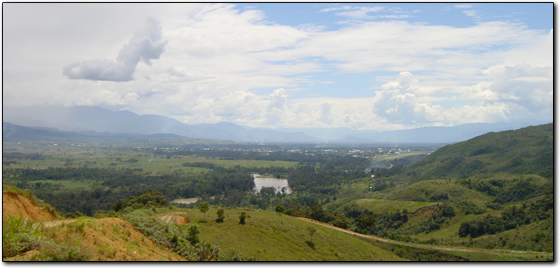
Baliem Valley
The plane to Wamena was a low-slung, twin-engine turboprop with the front half of the fuselage for cargo. With a shuddering roar the plane took off, circled above lake Sentani and then turned southeast to the highlands. We flew over the twisted Mamberamo river once again, not a sign of civilization in sight, then turned inland towards the Baliem valley. Hills with cascading rivers quickly rose from the flat floodplain. The hills grew into mountains, then into menacing limestone cliffs. We spied a collection of huts, the first sign of life since Sentani, then passed over the mountains into the Baliem valley. Suddenly there were signs of an active and flourishing civilization. Fishponds and mounded potato gardens, cut by the shimmering silver Baliem river, spread out below. Ferdinand, Ruslan’s friend from Adventure Indonesia, was there to greet us when we landed, chasing away the airport touts. He helped us to find a cheap hotel, and introduced Romy, one of his porters who could act as a guide. With our Indonesian, we didn’t need a guide who spoke English. After a little negotiation, we arranged a six-day trek for the next day, giving us just enough time to buy food and repack our bags. We would be happy to leave our noisy hotel. It seemed to have a rather dubious reputation…
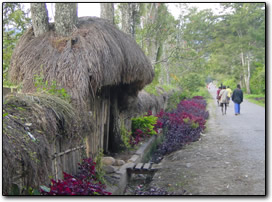 |
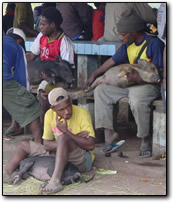 |
For a town with no road connections to the outside world, Wamena is surprisingly developed. Although everything has to be flown in, “from the floors to the doors”, there are plenty of solid houses as well as minivans and four-wheel-drive jeeps. Bicycle-rickshaws are a good way to get around, and a great way to support the local Papuan drivers. They don’t ask outrageous prices when they see tourists, like elsewhere in Indonesia. At 1600m, the air is cool. Broad, mountainous vistas extend in all directions from the flat valley. Nearby Mt Trikora, at 4700m, should be visible from town, but it was always covered by clouds during our stay. Despite its small size, Wamena was just too noisy, dusty, seedy and city-like to please. It was, however, the only place to find restaurants and shops. At night along the main drag, Jalan Trikora, Indonesian street vendors gathered to sell bakso (a kind of noodle soup) and piping-hot fried bananas. Fresh fish, flown in daily from the coast, was available down the street at a small market. Papuans, squatting on the ground, sold baked sweet potatoes, betel nut, dried flowers and passion fruit by candlelight. One corner had been taken over by a group of transvestites. As we passed, they called out “hello mister!” in hoarse, effeminate voices before breaking into titillating laughter. A hot, greasy fried banana was a perfect dessert on a chilly highland evening.
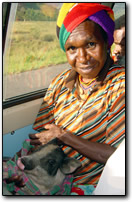 |
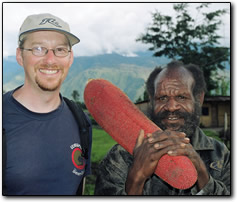 |
